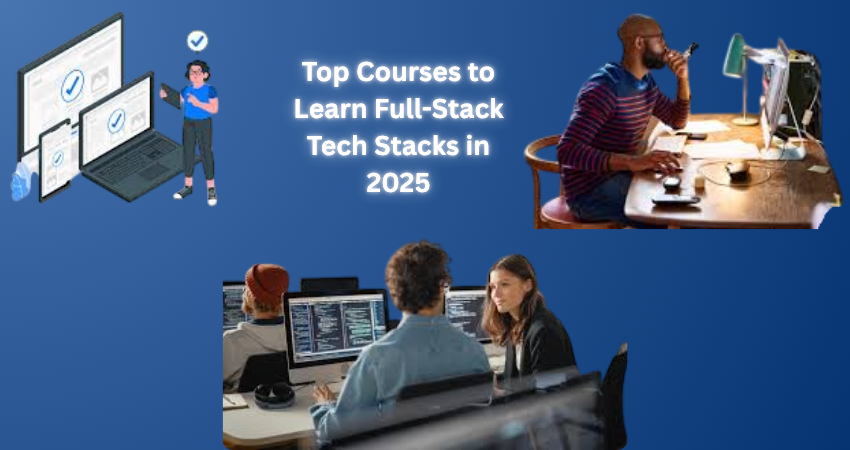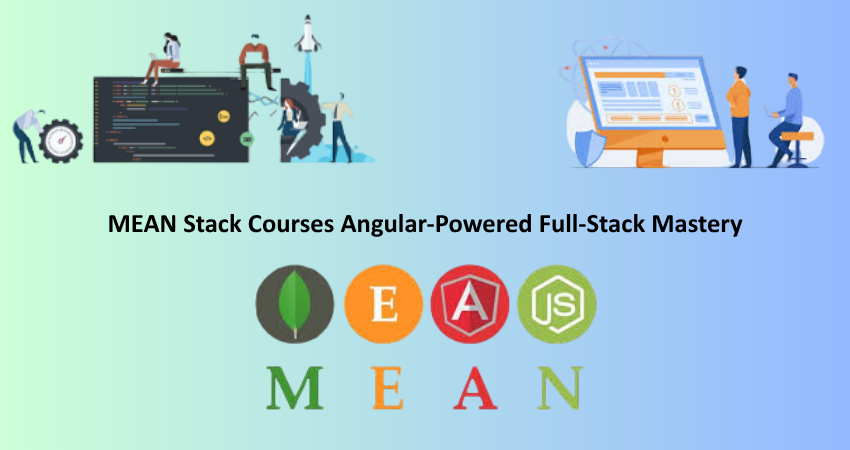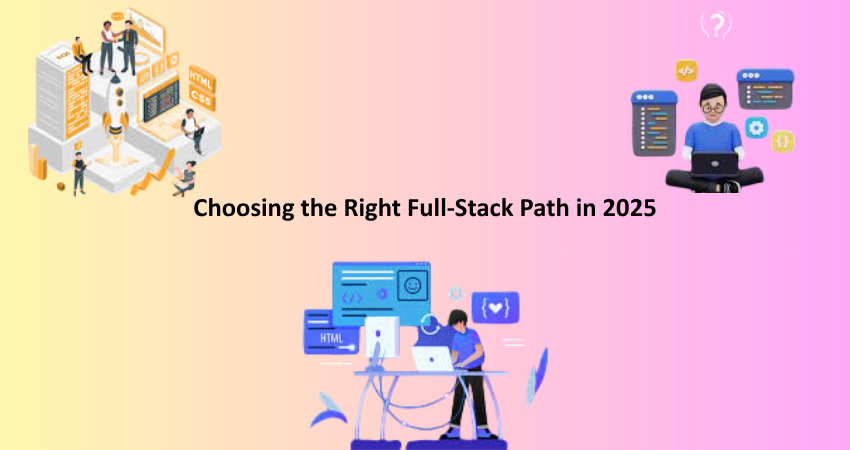
Introduction
Even in 2025, full-stack development will remain one of the hottest and highest-paying professions within the information technology arena. Full-stack developers will be expected to demonstrate proficiency in front-end and back-end development of websites and applications, thus making them even more sought-after by startups, agencies, and large corporations. However, the fast-changing nature of technologies, frameworks, and tools tends to quite easily generate confusion in aspiring developers about which path to take or in which area to specialize. However, there are now several curated, updated full-stack development courses for developers who want to stay ahead in the market.
If you just want to start from ground zero or dig deeper into popular stacks like MERN (MongoDB, Express.js, React, Node.js), MEAN (MongoDB, Express.js, Angular, Node.js), or Django + React, a right course would directly affect your path to becoming successful. With interactive learning and certification being offered by more platforms, to select a good course for gaining success in 2025 is paramount. The article thus highlights some top courses that touch on the contemporary full-stack tech stack, placing emphasis on content quality, instructor quality, community support, and practical application. If you sincerely want to become an all-round and competitive full-stack developer, then these recommendations will help you find a clear path forward.
MERN Stack Courses: Mastering MongoDB, Express.js, React & Node.js
The Complete MERN Stack Developer Course on Udemy
The course is now considered one of the most renowned and practicable courses for budding full-stack developers. The “Complete MERN Stack Developer Course” in 2025 on the online education platform Udemy is intended for an audience going through hundreds of changes and modules in JavaScript and all associated libraries. This particular course is set up to take its students from naught to production with the MERN stack, undergoing a step-by-step process initializing with installing React basics and developing single-page applications with hooks, state management, and components-driven architecture. Next to that, it moves towards Node.js and Express to cover all server-side development pieces on how to create and connect RESTful APIs. Lastly, a rigorous introduction is included into MongoDB for data storage and advanced topics such as token-based authentication using JWT and secure login flows.
A very practical aspect that makes this course different is that the students work on real projects that require the development of several full-stack applications, such as an eCommerce platform and a task management app. It gives the experience of real-life software development as well as application deployment on platforms such as Heroku and Vercel. Learning not limited to deployment also envelops application design, testing, and debugging. Coordination and version control with Git and GitHub prepare students for real job roles. This particular Udemy course has more than 40 hours of content, which is really worth it, along with lifetime access to downloadable resources and quizzes. The course not only offers a forum for Q&A on the course but also creates a community of peer learners with whom learners can get help and feedback directly from the instructor.
Codecademy’s Full-Stack Engineer Career Path
Providing a top-notch program for learning the MERN stack, the Codecademy “Full-Stack Engineer” career track can also serve as an excellent course to be a good professional in developing applications using the MERN stack. This course has been designed to come up with a guided curriculum for several months of studies, which has both HTML/CSS and backend development as well as database management. The course has dedicated modules for React and Node.js and goes beyond the traditional scope of MERN stack, covering newly updated ES6+ features, integrated reactors using the React Router, and Express.js API designs. Moreover, the course also includes MongoDB CRUD operations and much more advanced topics like asynchronous JavaScript and HTTP requests with JSON handling, which are necessary for communication between the front end and backend.
Codecademy becomes unique with its interactive coding platform, unlike the usual video-based course, that got students to write and run code in their own when feedback is received at once. Lessons contain practical exercises, mini-projects, and capstone challenges modeled on realistic development tasks in between the lessons. Students, thus, benefit from a set schedule with weekly objectives and optional career coaching. For 2025, Codecademy has thus introduced AI hints and contextual feedback, which make the learning experience much richer for students finding it hard to grasp difficult concepts. With a lively community of learners and certification at the end, this program is a perfect fit for students who want a guide throughout their learning journey and want to build a complete portfolio.
MEAN Stack Courses: Angular-Powered Full-Stack Mastery

Coursera’s Full-Stack Web Development with Angular by The Hong Kong University of Science and Technology
“Full-Stack Web Development with Angular” is a specialization in MEAN stack related subjects under Coursera by The Hong Kong University of Science and Technology. The course has several modules of client-side and server-side development but includes front-end design using Angular for starters. It covers TypeScript, component-based architecture, and services in Angular. This will help learners acquire a solid grasp of reactive design and UI logic. Server-side development with Node.js and Express.js is then introduced, along with in-depth tutorials on the usage of MongoDB for dynamic data handling. Finishing with integration strategies that bring all elements of the MEAN stack together for an integrated full-stack experience.
Indeed, a pretty good strength of the Coursera course structure is that it consists of 4 units that are folded into each other, providing graded assignments, peer reviews, and real-world projects in each unit for the learners. This does not mean that learners consume information. At the end of the course, each student will have to build a full-blown restaurant review platform using full CRUD functionality, form validation, and secured authentication to emulate the kinds of applications one would find in an enterprise environment. One of the key highlights of this specialization is that it gives the student university-grade instructions which could come with certificates and, in some cases, academic credit. A great option in 2025 for those learners looking for a formal education coupled with a structured learning environment.
Angular – The Complete Guide by Maximilian Schwarzmüller on Udemy
Maximilian Schwarzmüller’s “Angular – The Complete Guide” is the gold standard to learn Angular as part of a full stack skill set in 2025. This course mostly focuses on Angular but also has supplemental notes about integration with Node.js and Firebase that offer it’s students an excellent backend tie-in like MEAN stack development. It takes everything–from Angular CLI set-up, data binding, and form validation to routing, guards, and RxJS observables-and solidifies this course into a strong front-end architecture. Real-life applications like recipe books, shopping lists, and admin dashboards are incorporated into it, thus exposing students to scalable code and modular developing patterns.
It is the depth and clarity of the course that makes it unique. He explains some complicated Angular concepts by easy-to-follow visual aids and stepwise demo. The learners get to know how to debug, test, optimize their angular apps as well as work with other third-party modules, HTTP clients, and custom pipes. The Firebase integration section introduces real-time databases, authentications, hosting, making it nearly a complete stack experience for the students. One such example is you can make a difference in your angular learning into becoming a full MEAN capable using this course with Node.js and MongoDB course. Truly lifetime access to regular updates with responsive instructor support makes this among the best courses in which to train in mastering angular full stack development.
Django + React Stack Courses: Combining Python and JavaScript
Zero to Mastery’s Complete Web Developer Course with React and Django
A world-class, full-featured full-stack feature using Django and React in 2025 is the “Complete Web Developer” course offered by Zero to Mastery and taught by Andrei Neagoie and team. This course is especially relevant to those users really wanting to use Python in the backend by React for the front-end, as it teaches how to build RESTful APIs using Django and the Django REST Framework and connect that to the react frontend via hooks, axios, and Redux for state management. It also covers deployment practices on Docker and cloud platforms, which makes it a very practical and production-oriented learning path for learners.
This course promises to be very thorough, teaching anything from the very basic to more advanced topics. Thus, the course should apply to unsuitable candidates and even intermediate developers. Students will create several full-stack applications, including a blog platform and a job board where they apply concepts like token-based authentication, image upload, and third-party API integration. Focus is [set] on a scalable project structure, version controlling, and modern development workflow using VS Code, Prettier, and GitHub Actions. For learners who want to really build portfolios with both frontend and backend skills using one of the most sought stack combinations, this course promises to be an enjoyable combination of an intensive curriculum with [hands-on] support and an active alumni community.
JustDjango’s Professional Django + React Stack Course
The professional Django + React Stack offered at JustDjango is a premium course for learners who want to build production-level applications with Django and React. There’s no fluff and no time wasted in JustDjango’s approach; the course focuses on best practices and real-world implementations. Inside the course, students will start with setting up a Django backend using Django REST Framework, after which they are to build a sturdy React frontend using React Router, Redux Toolkit, and Material UI. From authentication using JWT tokens to managing CORS to backend permissions, the students are taught to handle everything with utmost professionalism and methodical rigor.
The greatest strength of this course lies in its in-depth study of deployment and performance. The students are introduced to Docker and NGINX to containerize and serve their apps as efficiently as possible. Other course modules discuss CI/CD pipelines, database migration, and managing environment variables for staging and production environments. The course goes beyond just coding—very much unlike shorter tutorials—to make the learner reflect upon things such as architecture, scalability, and maintainability, making it entirely appropriate for anyone serious about having a career in full-stack development and interested in crunching down on complex projects. This made JustDjango’s course one of the most professional training programs for Django + React development in 2025 by giving students premium support, GitHub repositories, and regular updates.
Choosing the Right Full-Stack Path in 2025

Factors to Consider When Selecting a Course
Just like many other courses, choosing a full-stack course among the myriad high-quality courses in 2025 requires some thoughtful discretion. First off, examine your background and favorite language. If you find yourself more at home with JavaScript, the merit of MERN or MEAN stacks would become more pronounced; on the other hand, if you are fond of Python development, you would be inclined towards Django. Next comes scrutinizing the mode of delivery like whether the course is project based, modular, or purely academic. Typical project-based courses have an objective to integrate real-life situations for better hands-on skills gained, and academic ones are more inclined toward theory and quite longer with regards to time span. Take stock of the end-to-end development training, which encompasses frontend, backend, deployment, and version control, while looking for courses that are offering such trainings.
It is also important that the teacher is qualified. Instructors who practice development will share insights outside of textbooks. They have to make clear complex notions and pragmatic advice together with timely updates necessary for a successful learning process. Community support, too, importantly plays its role in having active forums or Discord groups or even peer networks for courses that would afford collaborative learning and resolution of blockers that are done fast. Also, check whether this course comes with a certificate as it would be important during job hunting. Just like it won’t get you the job, it sure can add value to your CV when combined with project-based portfolios.
Career Benefits of Learning Full-Stack in 2025
In terms of placement in the future or the present career line, full-stack training in 2025 is all set to give it ample. Full-stack developers are in high demand, with most employers looking for people equipped with versatile problem-solving skills and project ownership attributes. Additionally, he can bring about a network among the teams and save time spent waiting for handoffs: it enables the individual to work on both the frontend and backend. Full-stack skills make one of the most valuable assets regardless of whether it’s a startup or corporation, and bring people from concept to deployment in most cases. Besides, there are places for freelancing where clients expect a real 1-person job to build a whole product or minimal viable product.
Full-stack learning fosters an even greater understanding of systems thinking beyond just programming. You will learn how data flows through API transfer, how client-server architectures work, and how to deploy applications in a reliable manner. These skills serve as springboards into other roles, such as DevOps, software architecture, or even product management. Full-stack training also builds your confidence for technical interviews, mostly centered around live coding or system design. With the job market now dictated by flexibility, automation, and rapid development, the ability to masterful a full-stack tech stack forms the new key towards sustainable employability and future-proofing.
Conclusion
Full-stack development is therefore pivotal for software engineering, but 2025 will be another step ahead where many more options to learn appear. Whether you emphasize your efforts in mastering the MERN, MEAN, or Django + React stack, the right course will get you there faster, add on your portfolio, and prepare you for real-life problems. Each of these courses strikes a balance between depth and breadth to help you build not only functional applications but also scalable and maintainable systems.
As technology evolves, what will keep you ahead is your readiness to adapt and continue learning. An all-encompassing, pertinent, and hands-on full-stack course is one of the best investments one can make in their developer journey. So, dive in, build real-world projects, and become the kind of full-stack developer that companies will be lining up to hire in 2025 and beyond.